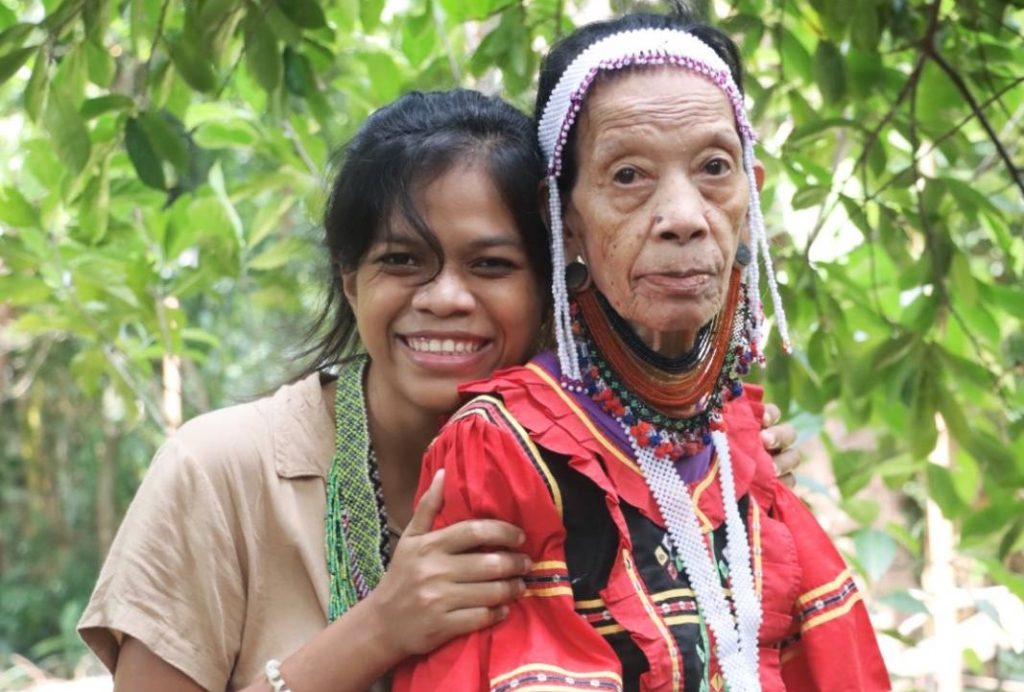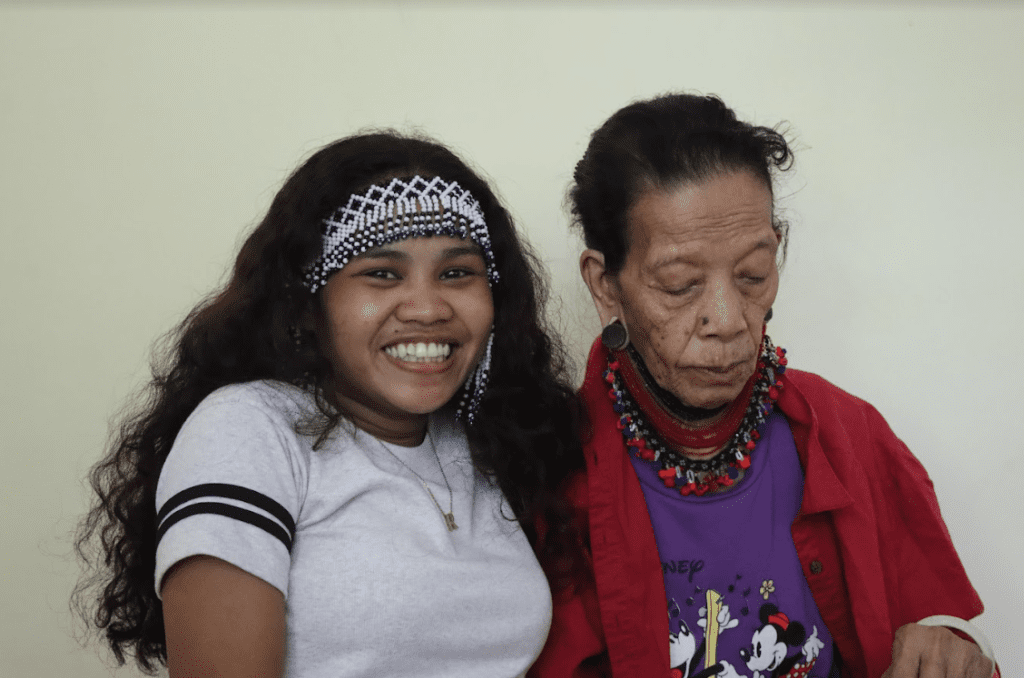DAVAO CITY, Philippines – For Lumad advocates and the public, Bai Bibyaon Ligkayan Bigkay, who died last November 20, is known as a fierce woman chieftain and defender of the Lumad ancestral domain. But for Lumad students, she was called ‘Ino Bai’, their term for elderly or grandmother, whom they encountered over the past seven years and helped them understand their campaign to defend their Lumad schools and ancestral land.
These Manobo students, Lala Empong, Kat Dalon, and Cristin Olado, are heartbroken to learn of their Ino Bai’s passing, which was announced by Sabokahan To Mo Lumad Kamalitanan or Sabokahan Unity of Lumad Women on December 6. Bibyaon is believed to be around 90 years old.
Lala Empong, one of the Lumad students, first saw Ino Bai in 2015 when her family arrived at the UCCP Haran in Davao for sanctuary when their Lumad school was attacked by the paramilitary. She had already heard of Bibyaon from the tribal leaders and was curious to meet her.
Lala remembers she and other girls did not interact much with Bibyaon in Haran as the leader would always stay in her shanty, occupied with making beads, which was a project to generate funds for their needs in the sanctuary.
Bibyaon the teacher
On a typical day inside the camp, Ino Bai appears to be like any other grandmother who seems strict, firm, and intimidating. But the girls got to discover more about her, her experiences in the mountains of Talaingod, and her commitment to defending their tribe and ancestral land.
They would get excited to listen to Bibyaon speak during rallies or in activities inside Haran.
“Syempre sa una, nacurious gyud mi kinsa siya ug unsa siya kay permi man siya mamahimong mamention sa among mga maistorya kung hisgutan gani ang ancestral land. Sa dihang na namo siya nagistorya sa usa ka activity, nakaingon gyud ko nga isog kaayo siya ug lalom gyud ang iyang mga ginabuhiang pulong,” Empong said.
(Of course, we were curious to see her because her name was always mentioned when we talked about our ancestral land. When we saw her talk in an activity, I could truly say she was very fierce and deep with her words.)

In 2017, Bai Bibyaon joined them in the “bakwit” school in Metro Manila, a campaign led by advocates to provide education to the students. Lala remembers Bibyaon’s routine.
“In the bakwit school until its last day, she wakes up as early as four am, we will be stirred by the sound of her pounding her betel nuts. She takes a bath after that and makes beads right away, but when we ask her about her life, she feels energized to share her story,” Lala said in Cebuano.
Bibyaon became one of their teachers as she explained the importance of their Lumad culture and traditional practices as part of their struggle.
Ino Bai will always remind the girls how to wear their tribal dresses, Lala said, that the dress length should extend below their knees, and with ‘some insertion to avoid early relationships’.
She also taught them to create their patterns for bracelets, necklaces, and headpieces.

Lala said Bibyaon would always remind them to focus on their studies and be thankful for the chance to learn despite their situation.
The Lumad schools were established two decades ago when Manobo leaders asked religious groups and NGOs to support their needs. But past administrations and the military suspected the schools were funded by rebels and shut them down.
Bai’s translator
Cristine Olado first met Bai in Haran when her grandmother, a close friend of the chieftain introduced her. In the bakwit school in Manila, Cristine was chosen by Bai to be one of her translators during forums, gatherings, and interviews.
“Ino Bai is kind, but she is fierce when she talks about our struggles. As her translator, she did not want a word added or taken away from what she said because she somehow knew. She wanted her exact message to be delivered to the people,” Cristine said.

Despite the language barrier, Cristine recalled Bai was patient with people who asked questions, and Bai would advise her to always listen carefully to her words to make people understand their Lumad struggle.
In their free time inside the bakwit school, Cristine and her classmates would visit Bai in her tent to listen to her stories, from tales about Pantaron to personal questions on why she decided not to marry.
Their ‘idol’
Kat Dalon said she and her classmates then were excited to meet Bai in 2017 when they arrived in Haran as if they were meeting a celebrity.
She cannot forget that day when her teacher in the bakwit school introduced them to Bai, who was wearing a blue blouse and busy working on beads.
During a solidarity night with visitors, Bai spoke to the Lumad and visitors and she remembers her words.
“She spoke so calm yet so powerful,” Dalon remembers “She strictly told us not to be swallowed by the ‘burgis’ culture which will affect our tribe,” Kat remembers.

She met Bai again in the bakwit school the following year and also became one of Bai’s translators in events.
Kat remembered Bai lending her own headdress or “sangkad” as she appeared in a Zoom event to speak on behalf of the bakwit school.
For these students, they remember Bai for her patience, like a grandmother who would console them amidst the challenges of red-tagging and repressive attacks from the government.
“Taas kaayo siya og pasensya. Wala gyud namo siya nadunggan nga nagreklamo nga dugay na kaayo siya dire sa Manila, dugay na kaayo siya sa pakigbisog. Wala namo siya ever nadunggan ana kumpara sa amoa nga mga batan-on nga mapul-an na dayon,” said Dalon.
(She was very patient. We never heard her complain that we have stayed in Manila for so long; she has led the struggle for very long. We never heard complaints, unlike us young people who would easily get weary.)
Cristine would remember Bai would perform the ‘uranda’ or chanting about their Manobo history to them in the bakwit school, and remembers Bai’s words.
“Kung mawala daw sya naa syay ikabilin nga nahibaw-an namo gikan sa iyaha nga mabitbit daw namo nga dili mawala kung asa mi naggikan. Kung unsa amoang kultura mabitbit daw namo,” Olado said.
(She said when she passes, she would like to leave something coming from her, which we can carry on and that will make us remember where we are from. That we will always carry our culture wherever we are.) (davaotoday.com)
ancestral land, bai bibyaon, lumad, talaingod









